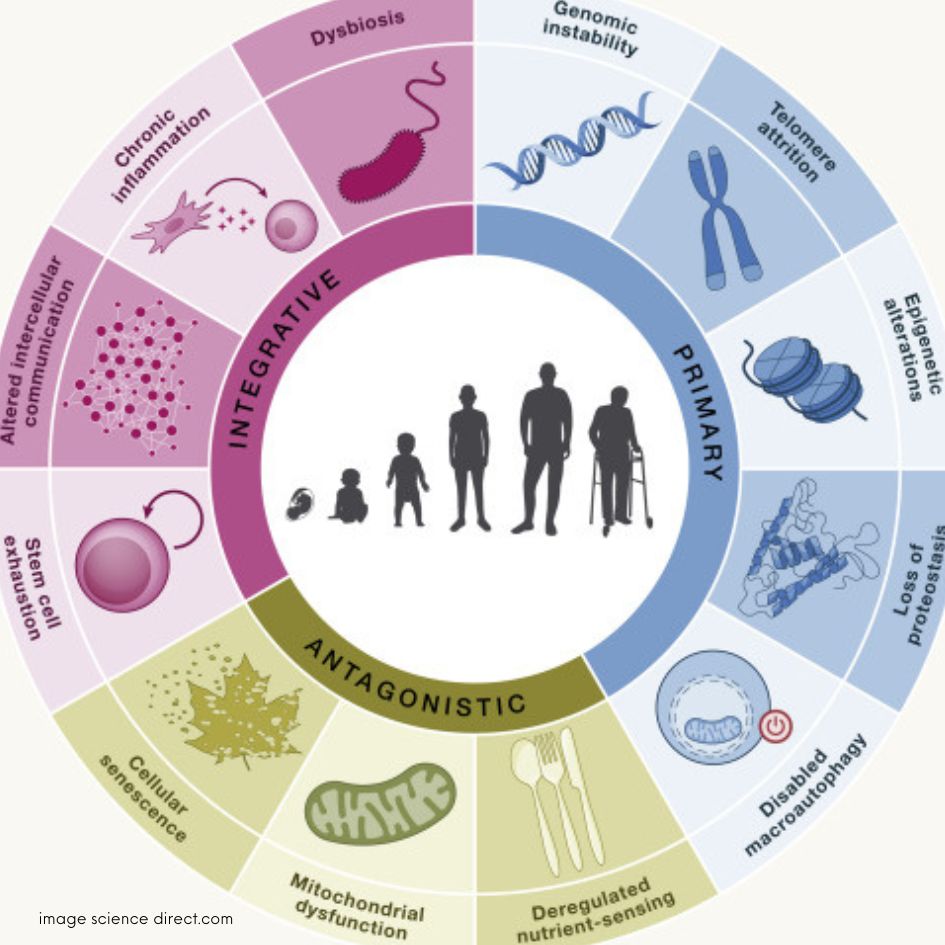
Understanding the 12 Hallmarks of Aging and How a Healthy Lifestyle and Supplements Can Slow Down Aging
Share
Understanding the 12 Hallmarks of Aging and How a Healthy Lifestyle and Supplements Can Slow Down Aging
Aging is a natural part of life, but it doesn't mean we have to accept it without a fight. Scientists have uncovered 12 hallmarks of aging, which are fundamental biological processes that contribute to the aging of our bodies. By understanding these hallmarks and making conscious choices, we can take control of our aging process and potentially slow it down. Let’s explore the 12 hallmarks of aging and discuss how a healthy lifestyle and supplements can help us age gracefully.
The 12 Hallmarks of Aging
Genomic Instability
Genomic instability refers to the accumulation of DNA damage over time, leading to mutations and cellular dysfunction. While we can't avoid all sources of DNA damage, we can reduce exposure to harmful UV radiation and chemicals, and we can support DNA repair by consuming a diet rich in antioxidants and essential nutrients.
Telomere Attrition
Telomeres are protective caps at the ends of our chromosomes, and they shorten with age. Shortened telomeres are associated with cellular aging. Stress-reduction practices like meditation and a healthy lifestyle, including a balanced diet and regular exercise, can help slow down telomere attrition.
Epigenetic Alterations
Epigenetic changes modify DNA and affect gene expression. We can influence our epigenetic profile through lifestyle choices, including a diet rich in plant-based foods, regular exercise, stress management, and adequate sleep.
Loss of Proteostasis
Proteostasis is the body's ability to maintain protein balance. To support proteostasis, prioritize a diet rich in protein and amino acids, engage in regular physical activity, and consider intermittent fasting to help your body clear out damaged proteins.
Deregulated Nutrient Sensing
As we age, our bodies' ability to sense and respond to nutrients declines, potentially leading to imbalances in energy metabolism. Maintain a balanced diet, limit sugar and processed foods, and consider intermittent fasting or time-restricted eating to improve nutrient sensing.
Mitochondrial Dysfunction
Mitochondria are the powerhouses of our cells, and their function declines with age. Support mitochondrial health by consuming antioxidants, engaging in regular exercise to stimulate mitochondrial biogenesis, and considering supplements like coenzyme Q10 and L-carnitine to boost mitochondrial function.
Cellular Senescence
Cellular senescence occurs when cells lose their ability to divide and function properly, contributing to aging. Reduce cellular senescence by maintaining a healthy lifestyle with regular exercise, a balanced diet, and effective stress management.
Stem Cell Exhaustion
Stem cells play a vital role in tissue repair and regeneration, but their number and functionality decrease with age. To support stem cell health, prioritize a nutrient-dense diet, regular exercise, and explore stem cell therapies when appropriate.
Altered Intercellular Communication
Effective communication between cells is essential for maintaining tissue and organ health. Age-related changes in intercellular communication can lead to chronic inflammation. Support healthy cell communication with an anti-inflammatory diet, stress management, and supplements like omega-3 fatty acids and turmeric.
Tissue and Organ Dysfunction
As we age, tissues and organs may lose functionality. To slow this process, maintain a healthy lifestyle with a balanced diet, regular exercise, sufficient sleep, and stress management. Regular health check-ups can also help detect and address age-related issues early.
Accumulation of Senescent Cells
Senescent cells no longer divide and can harm surrounding tissues, accumulating in our bodies as we age. Strategies like periodic fasting and senolytic therapies may help clear out these senescent cells and promote healthier aging.
Alterations in the Microbiome
Recent research has highlighted the influence of our gut microbiome on aging. An imbalanced microbiome can lead to inflammation and metabolic disturbances. To support a healthy microbiome, consume a diet rich in fiber, prebiotics, and probiotics, and consider personalized approaches like fecal microbiota transplantation (FMT).
Slowing Down Aging with a Healthy Lifestyle
Now that we've covered the 12 hallmarks of aging let's explore how a healthy lifestyle can help slow down the aging process:
Balanced Diet: Eating a well-balanced diet rich in whole foods, including fruits, vegetables, lean proteins, whole grains, and healthy fats, provides essential nutrients and antioxidants that support various aspects of healthy aging.
Regular Exercise: Physical activity has numerous benefits for aging, including improving cardiovascular health, maintaining muscle mass, and enhancing overall well-being. Aim for a mix of aerobic, strength, and flexibility exercises.
Stress Management: Chronic stress can accelerate aging, so practice stress-reduction techniques like meditation, yoga, deep breathing exercises, or spending time in nature.
Sleep: Quality sleep is essential for the body's repair and regeneration processes. Aim for 7-9 hours of restful sleep per night.
Hydration: Staying well-hydrated is crucial for overall health and can help maintain skin elasticity and organ function.
Avoiding Harmful Habits: Limit or quit smoking, reduce alcohol consumption, and avoid excessive sun exposure to protect your skin and overall health.
Mental and Social Engagement: Stay mentally active by challenging your brain with puzzles, reading, or learning new skills. Maintain a strong social network to support emotional well-being.
Supplements for Healthy Aging
While a balanced diet should be your primary source of nutrients, supplements can complement your efforts to slow down aging:
Antioxidants: Consider supplements like vitamins C and E, Glutathione as well as coenzyme Q10 and alpha-lipoic acid, which have antioxidant properties that protect against oxidative stress.
Omega-3 Fatty Acids: Omega-3 supplements, like fish oil, can help reduce inflammation and support heart and brain health.
Collagen: Collagen supplements may improve skin elasticity and joint health.
Coenzyme Q10 (CoQ10): CoQ10 can support mitochondrial function and overall energy production.
NAD+ precursors and complete booster strategy which helps support cellular energy and DNA repair.
Curcumin (Turmeric): Curcumin supplements have anti-inflammatory properties and may support joint and cognitive health.
Probiotics: Probiotic supplements can help maintain a healthy gut microbiome and support digestion and immune function.
Aging is a natural process, but understanding the 12 hallmarks of aging and taking steps to mitigate their effects through a healthy lifestyle and supplements can help us age more gracefully and enjoy a higher quality of life as we grow older. Embrace the journey of aging, and remember that small changes in your daily routine can make a significant difference in how you age. With knowledge and awareness, you can take control of your aging process and live a longer, healthier life.
